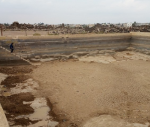You are here
Selective media coverage of war on Gaza
Dec 02,2023 - Last updated at Dec 02,2023
The ongoing war on Gaza has not only been a harrowing chapter in the longstanding Palestinian-Israeli conflict, but has also served as a stark lesson in the hypocrisy of global powers. The images of hostages reuniting with their families, while hopeful, cannot overshadow the haunting realities that have unfolded since October 7.
In everyday life and on social media, there is a shared sentiment among people who express feelings on the brink of madness. The bitter truth is that there seems to be little one can do. As the conflict between Gaza and Israel unfolds, a disconcerting pattern of media coverage emerges, one that raises critical questions about journalistic integrity and the responsibility of media outlets. The war, marked by its complexity and human tragedy, has been marred by a form of media hypocrisy that demands global attention.
Gaza has become a real-time lesson in the illusion of international law. Unlike conflicts in Iraq, where it took years for the evidence to mount, Gaza's intensity and immediacy have stripped away any semblance of justification. The conflict is happening in front of our eyes, live-streamed for the world to witness. The bombardments are so relentless that entire families are wiped out, thousands are displaced and children are dragged in makeshift sleds, a heartbreaking scene that adds a moral force to the staggering death toll.
In confronting such atrocities, the limits of what people can be plausibly told are not possible. Consent in politics is often secured by convincing people that certain matters are beyond their understanding or control. Yet, the inability to persuade even the most ardent supporters of the so-called ‘only democracy in the Middle East’ of the plainly obvious, that the events of October 7 cannot be erased by more horror, is a shocking revelation. The brutal lesson learned is that human rights are not universal and international law is arbitrarily applied.
Where this revelation leads is uncertain. What is certain is that people have seen too much, and the impact will endure. Regardless of the fragile truce that has brought a glimmer of hope, darkness has been released into the world. Its final form is yet to take shape, but its impact is undeniable. In grappling with the aftermath of Gaza, the international community must confront its own contradictions and inconsistencies. The world powers must reconcile their rhetoric with the stark realities on the ground. The people of Gaza, and indeed the world, deserve a more transparent and principled approach to conflicts that respect the sanctity of human life and uphold the ideals of justice and equality. Only then can we hope to move beyond the shadows that this conflict has cast on the principles we claim to hold dear.
The very essence of journalism is rooted in objectivity, truth-seeking and the impartial conveyance of events. However, the coverage of the Gaza-Israel war seems to reflect a selective lens, leaving a glaring gap between the reality on the ground and the narratives presented to the global audience.
One of the glaring issues is the disproportionate focus on certain aspects of the conflict while neglecting others. Images and stories of destruction in Gaza are sporadically interspersed with depictions of Israeli resilience, creating a narrative that lacks the equilibrium necessary for an unbiased understanding of the situation. This asymmetry not only distorts the public's perception, but also raises concerns about the media's role in perpetuating a narrative that may not accurately represent the human toll on both sides.
The framing of headlines and the choice of language further contribute to this media paradox. Terms like "conflict" and "clashes" are used interchangeably, diluting the gravity of the situation and inadvertently portraying a sense of symmetry that does not exist. Such linguistic choices can influence public opinion, shaping perceptions and fostering a skewed understanding of the power dynamics at play.
Moreover, the reliance on official statements and press releases from authoritative figures can contribute to the perpetuation of a sanitised version of events. Critical analysis and fact-checking seem to take a backseat, allowing political narratives to seep into the media coverage unchecked. The result is a narrative that echoes the perspectives of those in power, potentially neglecting the nuanced realities of the conflict.
Another facet of this media paradox is the inconsistent attention given to civilian casualties. While certain incidents receive extensive coverage, others remain relegated to the periphery. This selectiveness inadvertently reinforces a narrative that downplays the human cost of the conflict, contributing to a lack of empathy and understanding among the global audience.
The international media's portrayal of the Gaza-Israel war also seems to reflect geopolitical biases. The framing of events often aligns with the interests of the media outlet's home country, raising questions about the ability of media organisations to transcend national or regional biases and provide objective reporting.
The media's coverage of the Gaza-Israel war exposes a troubling hypocrisy that undermines the principles of journalism. As consumers of news, we must demand transparency, accountability and a commitment to truth from media organisations. Only through a concerted effort to rectify these imbalances can we hope to foster a more informed and empathetic global discourse around the conflict.
What adds to the sense of disillusionment is the apparent breakdown of the global rules upheld by global powers. For the first time in recent memory, they seem unable to convincingly portray adherence to a universal system of rules. Instead, there is an acknowledgment of exceptions, an acceptance that some situations are beyond explanation and a resignation to the fact that the conflict will continue until Israeli authorities decide otherwise.
The rapid escalation of events left no time for the usual justifications and narratives to be established. The pace of death during Israel's campaign is unprecedented, leaving military experts astounded. The densely populated area of Gaza makes civilian casualties unavoidable, and evidence supporting the claim of undermining Hamas’s capabilities, the potential justification for such casualties, remains scarce.
Addressing media hypocrisy requires a collective commitment to journalistic ethics and a re-evaluation of the industry's priorities. Media outlets must prioritise comprehensive and unbiased reporting, challenging the status quo and providing audiences with a more nuanced understanding of the complexities involved.












Add new comment